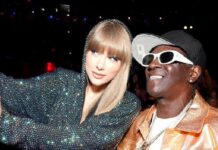[videowaywire video_id=”NXQKXQ1WGCBT2B5B”]

*The third season of “The Vet Life” premieres TONIGHT (Jan. 13), and it opens with a Hurricane Harvey special which follows the Cy-Fair Animal Hospital reopening after being closed for multiple days due to Hurricane Harvey.
Additionally on the season, Dr. Blue takes a trip to a Vegan cattle ranch to stop an unexpected cow baby boom, Dr. Ross deals with a trip of mischievous ferrets with a skin condition, and Dr. Lavigne performs a knee surgery on an old English bulldog that was rescued from a puppy mill.
In between offering the best medical treatment to their patients, the Doctors at this Texas-based veterinary practice must simultaneously balance their personal lives with wives and kids– all while supporting one another along the way.
EUR/Electronic Urban Report caught up with the three vets to dish about this new season, the healing power of animals, as well as their impact and influence as doctors of color.
Read our conversation below, and get a taste for “The Vet Life” via the clip above.
OTHER NEWS YOU MIGHT HAVE MISSED: ‘2 Dope Queens’ Are ‘Keeping It Hot, Fresh and Sexy for HBO’

What can you tell viewers about what they can expect this season?
Dr. Ross: You’re gonna see a lot of the hospital and how it works. The close brotherhood that the three of us have as well as all the pranks and games that we play. You’re going to see a lot of interesting cases. You’re going to see a lot of exotic animals that normal practitioners don’t see. Dr. Lavigne started doing orthopedic surgery, so you’re going to see a lot of cool surgeries, similar to what athletes suffer with — we call it an ACL tear. It’s called a cranial-cruciate ligament tear in animals. And Dr. Blue sees a lot of the farm animals, so you’re going to see a lot of goats, a lot of pigs, and a lot of special surgeries that Dr. Lavigne performs.
This season opens with a Hurricane Harvey special. Talk about how the hurricane impacted you personally and professionally.
Dr. Blue: With Harvey coming in the way it did, and all the water it dumped on us…. my brother and his family are still living with me ‘cause their house was damaged in the hurricane. So I’m still dealing with the effects of it and in addition to that, we pride ourselves on being a hospital open seven days a week for our clients and we were shut down for six days and that’s unheard of in the history of the Cy-Fair Animal Hospital. I know the history isn’t that long, only two and a half years but that’s unheard of for us. And one of our oldest technicians lost everything in the storm, including her car.
Talk about the challenges of rescuing injured and displaced animals affected by hurricane-ravaged communities?
Dr. Ross: Dr. Blue and Dr. Lavigne worked with Houston Pets Alive/Austin Pets Alive — that took in a large number of animals that were displaced in this storm. What they ended up doing was going out to where they were housed, at a large facility, and provided veterinary care there. Just this week, the three of us spade and neutered a lot of dogs and cats that were displaced in Hurricane Harvey that needed to be re-homed. Most of the local shelters take in a lot of animals, so saw a lot of the animals that were normal clients at other hospitals. We try to help out as much as we can and give back to the community. I know Dr. Blue and Dr. Lavigne did a lot of work out there while I had to stay and work at the clinic.

Let’s talk about the healing power of pets. Why do you believe pets have this ability to make people feel happy and healthy?
Dr. Blue: One of the main reasons is there’s a real thing called the human-animal bond and basically it’s something where animals tend to give, especially dogs, unconditional love and that unconditional love is something that you just can’t pay for. And I think that’s why, especially with dogs, their understanding and loyalty to people is just such a great tool to help with healing. I think people that have those animals that are emotional support is just a bond that you really can’t understand unless you’re there. In addition to that, they can sense things that we can’t, hence the seizure dogs and diabetic dogs.
What’s the most exciting development you’ve seen in veterinary medicine in recent years?
Dr. Ross: The way that owners take care of their animals. Me growing up in Houston, in an urban community, a lot of people that I grew up with did not take care of their animals. It was more or less if your dog is severely ill or if it got hit by a car, that’s when you see a vet. But I think now with education and everything that has evolved as far as pet care, we’re seeing a lot of animals come into the hospital for routine things. So I believe the client education and the willingness to bring your animal into the hospital from the owners. And not only that, for compliance, a lot of animal owners now comply with the some of the things that we’re doing, such as dental month every February. It’s a special that goes on around the world and ten years ago, this was not heard of.
Which developments in veterinary medicine do you hope will occur within the next decade?
Dr. Lavigne: One of the things that I think would really serve a huge benefit in the future is people taking more advantage of health insurance for their animals. Because there’s so many times where people have to make a tough decision on the health care of their animals based on their finances. And there are insurance companies out there for your pets. It hasn’t really taken off as much as it has on the human side, but hopefully, in the future, that’s something that will really improve and give people the opportunity to get the proper care that pets really need. Another thing would be, and this could relate to the human side, just more research and development with cancers and stuff. There’s a lot of things that maybe could be learned, ‘cause it is something that we see in animals a lot, and maybe in the future, if we can understand and know a little bit more about how cancer works and what causes it, we may be able to come up with more prevention for different types of cancers. Not only for pets, but also for people.
Dr. Blue: One of the things that I know would help is diversity. Veterinary medicine, traditionally, is a predominately white male-driven field. One of the things that we jokingly hear is, “I never heard of a black veterinarian. Is that a real thing?” Like we’re unicorns. Tuskegee University had traditionally provided about 95% of the black veterinarians in the country and they’re currently at about 75%-78% because other universities are opening their doors to applicable candidates. I think diversity plays a big role in the healthcare of animals. When you have people that look like some of the people in their community, they’re able to not only get that treatment but they understand it. The people in that community can say, “Hey, there’s a black vet there,” versus, “I have to go ten miles to get my animal treated,” and all you needed was a rabies vaccine because your parents never traditionally took your animal to the vet. So having the people that look like you in the community, or in your demographic, whether they look like you or not, with an understanding of the level of care that you should have.
What dietary and nutritional mistakes have you seen recently?
Dr. Lavigne: A dog looks at you with those puppy eyes and people want to feed them what they’re eating. They’re eating something good and they want to give CiCi a little taste of it and that ends up leading to obesity, diabetes, pancreatitis and lots of other health concerns. So I think if people were a little more educated about proper nutrition, and sometimes it takes what we call tough love. I know you want to give them these tasty treats but in the end, it can just harm them.
Dr. Blue: I see a lot of pigs and my clients with the pigs feed them beer and they’re like, “Is beer good for pigs?” And I’m like, “Is beer good for you? Do you know what a beer gut is? That’s not a normal thing. That’s bad.” Pigs already are fat and giving them beer is making them fatter, adds carbs and it leads to arthritis. You have to be careful with wanting to give in and treat your animals like us, ‘cause if not, they’ll end up looking just like us humans.
Is it your hope that “The Vet Life” provides viewers with tips on how to keep pets healthier?
Dr. Ross: One of the reasons we decided to do ‘The Vet Life’ was to help educated kids and inspire kids that look like us and let them know that there is a better avenue out there. There’s nothing wrong with playing basketball or football or playing sports but to let them know that you can be a doctor, a lawyer — you can be something other than an athlete. It’s okay to be a nerd. I’m a nerd. Dr. Blue is a nerd and Dr. Lavigne is definitely a nerd.
Dr. Blue: One of my favorite things I say to all the kids and vet students and pre-vets that I talk to is one of my favorite Jay Z lines, it says, “Whether we dribble out of this MF’er, rap metaphors and riddle out of this MF’er, somehow we gotta get out of this MF’er.” He was talking about the hood and the ghetto and that whatever it is we gotta do, somehow we gotta get out that mindset and out of this place that we are. Being from Detroit and never having to experience the veterinarian and parents that didn’t take their dogs to the vets, I believe we have to get out of that trap that is in our mindset. One of the things that we wanted to exemplify as men from Tuskegee is that you don’t always have to sell drugs or play sports or rap to get to where you’re at. Playing sports or rapping is cool, I which I could play basketball better than I can but if that’s not what God has set for you, being a doctor of veterinary medicine is an option, you can do it. Here’s three guys that look like you who can do it and you’re smarter than we ever could be because you guys were born and raised in the era of Google. So all you gotta do is ask Siri to do something and she can do it. So that is one of the things that we want ‘The Vet Life’ to give them.
Dr. Lavigne: One of the things that we really pride ourselves on is education. And it’s something that we do not just on camera. We do community outreach in some of the lower-income areas and we just want to get out there and educate people and really teach them about preventative care because practicing good preventive care is going to save them those huge medical bills when their animals get sick.
Tune into “The Vet Life” premiere Saturday, Jan. 13, at 10 pm ET/PT.
We Publish News 24/7. Don’t Miss A Story. Click HERE to SUBSCRIBE to Our Newsletter Now!





